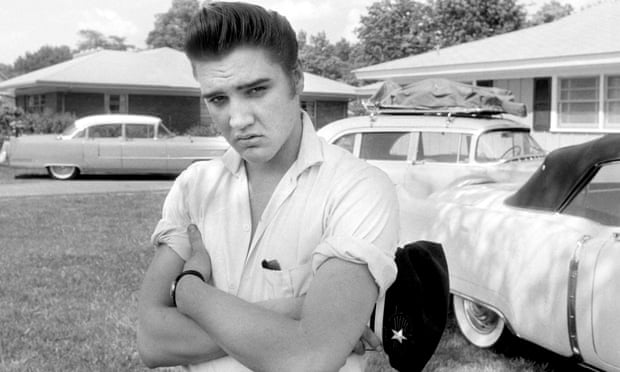
Today in 1935 a child king was born in Tupelo, Mississippi. While there’s no confirmation of three wise men, they’re hard to come by in Mississippi after all, his life has been chronicled as much as anyone born after that other child king from Bethlehem. He directly inspired the man that would later claim his band was bigger than Jesus and is one of the most recognizable figures of the 20th century.
The king in question, of course, is one Elvis Aaron Presley. He didn’t invent rock and roll, he didn’t perfect rock and roll and he didn’t even write the majority of songs he recorded. What he did do he did better than anyone before him and, many would argue, better than anyone since.
To understand Elvis’ impact is to understand the time in which he lived. Elvis rose to fame long before desegregation in the United States. As such, he lived in a stratified world in which proper white folk didn’t listen to the music that black folk listened to. The problem was that the black folk had better music and the white folk knew it. Elvis was able to introduce what was then termed “race music” to the white masses and in doing so redefined popular music as a whole.
Elvis grew up with gospel music and was subsequently exposed to jazz and blues when he moved to Memphis at age thirteen. As part of growing up in the South he was also steeped in country music. When Elvis was eighteen he went to Sun Records in Memphis to record his voice. The owner of Sun Records, Sam Phillips, heard Elvis and was impressed. Phillips teamed Elvis with a guitarist and bassist and in 1954 they recorded and released a blues song and a country song, “That’s All Right” and “Blue Moon of Kentucky”.
Sun Records sold Elvis’ contract to RCA in 1955 and that same year Elvis had his first #1 hit, “Heartbreak Hotel”. The total number of #1 and Top Ten hits for Elvis is hard to quantify because many times both the A-side and B-side were huge songs. Elvis’ self-titled debut album became the first rock and roll album to top the Billboard album chart and it stayed at number one for two and a half months.
Elvis’ first television appearance was on the Milton Berle Show in April of 1956, but it was his second appearance on June 5 that ignited a firestorm of criticism. Uncle Miltie convinced Elvis to perform his hit song “Hound Dog” without his guitar in order to allow the audience to better see him. Elvis used the opportunity to showcase his spastic, suggestive dance moves and parents (and their daughters) lost their minds. This performance caused Ed Sullivan to call Elvis “unfit for family viewing” and he vowed Elvis would never perform on the Ed Sullivan Show.
On July 1 Elvis made a ridiculous appearance on the Steven Allen Show where he sang “Hound Dog” to an actual hound dog. This episode marked the first time that Steve Allen beat Ed Sullivan in ratings. Predictably, Elvis made his first of three appearances on the Ed Sullivan Show only a few months later. An astounding 82% of televisions, 62 million viewers, were tuned in to see Elvis during his first appearance. To put this in perspective, the total population of the United States in 1956 was 169 million people and only half of the households in the U.S. even owned a television. Despite Sullivan’s best efforts at keeping the show clean, by Elvis’ third and final appearance he was only shown from the waist up.
Having conquered music and television, Elvis moved on to the silver screen. He made his film debut in “Love Me Tender”, which debuted in November of 1956. He appeared in over 25 feature films from 1956 through 1969 and provided songs for the soundtracks in addition to acting. While the quality of the movies always varied from decent to awful, toward the end there was a steady decline that prompted Elvis to return full-time to music. His movie career was briefly interrupted by a stint in the Army from 1958-1960. While he had the chance to enlist in Special Services, the entertainment branch of the Army, and use his talents to entertain the troops, Elvis chose the path of a common soldier. Quite a few people appreciated this gesture and Elvis earned thousands of new fans.
On December 3, 1968, twelve years after his television debut, Elvis made another landmark appearance. NBC broadcasted a show sponsored by the sewing machine manufacturer Singer Company, titled “Singer Presents Elvis”. Now known more widely as the “’68 Comeback Special”, this was not a performance by the drugged out, peanut butter and banana eating Elvis of his later years. This was an electrifying, iconic performance by a black leather clad Elvis at the top of his game. Though he had slowed down recording and stopped touring years ago the program was watched by a remarkable 42% of people that were watching TV at the time of airing.
A month later a new song from the show, “If I Can Dream”, reached #12 on the singles chart while the album reached the Top Ten. The return of the King was on and Elvis wasted no time in recording a follow up album, the outstanding “From Elvis in Memphis”. The record spawned a Top 5 single, “In the Ghetto”, and the album reached #13 on the Top 200 chart and #2 on the country album chart.
Elvis’ resurrection was further bolstered by a residency at the International Hotel in Las Vegas. It is here we are introduced to the svelte version of the jumpsuit wearing, karate chop dealing Elvis that would provide impersonators and comedians cheap applause for decades to come. Elvis would branch out from Las Vegas and was soon playing over 100 shows per year. By 1972 his marriage was failing and Elvis was getting more heavily involved with drugs. In 1973 he was still playing sold out shows but would often show up heavily drugged, slurring words and stumbling on stage.
Elvis continued recording and releasing relatively successful albums but live shows were a mess and his health was continuing to decline. He put on a tremendous amount of weight and continued to abuse prescription drugs, which exacerbated his health problems. His 1977 tour was cancelled due to his inability to perform and Elvis played his last show at Market Square Arena in Indianapolis on June 26 of that year. On August 16, 1977 he was found dead in the bathroom of his Graceland mansion.
The legacy of Elvis is essentially everything that has happened in rock and popular music since 1956. He has directly or indirectly influenced thousands of artists and he changed the fundamental concept of popular music as he ushered in and guided the early rock and roll scene. Elvis has sold at least 400 million albums and a greatest hits album issued to mark the 25th anniversary of his death has sold over 15 million copies alone. In 2013 Elvis music and merchandise earned $55 million and his Graceland home is visited by hundreds of thousands each year. He is one of the few artists to be respected by fans of rock, country, gospel, R&B and pop music and has been enshrined in at least fifteen halls of fame.
“That’s All Right” 1954:
“Little Sister” 1961:
“A Little Less Conversation” 1968:
“Suspicious Minds” 1969:
“Polk Salad Annie” live in Las Vegas 1970:
“Way Down” 1977:
